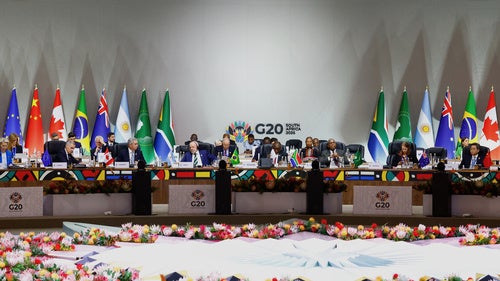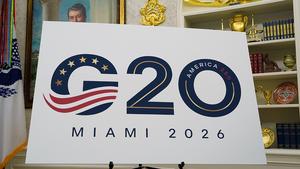Against a Backdrop of Political Friction, the G20 Gathered in South Africa. What Came Out of This Year's Summit?

The G20 summit carried on without the United States this year. Here’s what the leaders' declaration reveals about the rest of the world's priorities.
The Group of Twenty (G20) gathered in Johannesburg, South Africa, over the weekend, marking the first G20 summit led and hosted by an African country.
While much of the reporting in the lead-up to the summit centered on US President Donald Trump’s decision to skip this year’s gathering, leaders and representatives from 18 countries, the European Union, and the African Union came together against a backdrop of significant trade and political friction to discuss how to address pressing global issues from inequality to climate change to artificial intelligence (AI).
Nonresident Distinguished Fellow Julián Ventura, who previously served as Mexico’s deputy foreign secretary and G-20 sherpa, spoke with the Council’s Christina Colón about the significance of this year’s summit and what to expect as the United States takes over leadership of the forum.
This interview has been edited for length and clarity.
What is the purpose and relevance of the G20?
The G20 was born in 1999 to deal with the Asian financial crisis. It started originally as a forum for finance ministers and central bank governors of the world's major economies to facilitate economic and financial coordination, and it worked at that level until 2008.
It was originally an initiative by then Canadian Finance Minister Paul Martin, who later became prime minister. But in 2008, US President George W. Bush convened it at the leaders’ level to try to address the much wider fallout of the global financial crisis. It practically functioned in crisis mode in its early years and was quite effective at putting together specific actions to stabilize the global economy.
As the crisis faded into the background, the group gradually broadened its focus to address a wider range of global challenges, from climate change to corruption to global health issues—the latter particularly in the wake of the global COVID-19 pandemic. Since then, it has evolved into a kind of global sounding board, a space where agreements can be seeded among a smaller group of countries that can give policy direction to the various multilateral bodies that formally deal with these kinds of issues.
What did the G20 aim to accomplish at this year's summit? What were the key outcomes and agreements?
It's important to underline that the G20 is an informal grouping. Anything that comes out of it is nonbinding. It provides a setting for discussions. Usually, the host country defines a set of priorities, trying to build on what came before.
The South African G20 presidency this year came at the tail end of a string of Global South hosts, starting with Indonesia in 2022 and followed by India and Brazil. These summits placed more emphasis on social and development issues because of these countries' economic profiles and global outlook. At the outset of its presidency, South Africa defined a priority focus on issues related to equality, inclusion, sustainability, and cooperation for development. They sought to give particular attention to those that resonate most in the African agenda. Remember that this is the first time an African country has hosted the G20.
What we see in the Leaders’ Declaration that was approved in spite of US opposition—which argued from a distance that there was no consensus around much of the content of this very long 30-page document—are issues like disaster resilience, global health, immigration, and food security. These African priorities were developed over the year leading to the summit.
The declaration is premised on a strong reaffirmation of multilateral approaches to global challenges and the need to respect international law.
If we go back over the last two years, we see that India and Brazil invested significant diplomatic capital to give Africa a greater voice in the proceedings. The African Union was given a permanent seat in the G20 deliberations like the European Commission. The challenge at that time was to prevent differences over Russia’s invasion of Ukraine from hijacking the proceedings. Remember that Russia is a G20 member. This year, there was no significant debate on the issue, and what we see in the declaration is the G20 committing to “working for peace” in Ukraine and other conflicts, including those in Gaza, Sudan, and the Democratic Republic of Congo.
The document also contains commitments to work toward the reform of the United Nations and the World Trade Organization. These might seem impractical given the current very polarized situation, but I would say that they are welcome reaffirmations at a time when multilateral approaches are under severe stress.
In terms of specific outcomes reflected in the document, there are actions that aim to deal with money laundering and illicit financial flows, which are a big issue in the African agenda, as well as an AI initiative for Africa and a commitment to develop a critical minerals framework that can address developing countries’ needs given the current emphasis on critical minerals.
The document also highlights the importance of a comprehensive approach to immigration that respects national laws but also ensures safe, orderly migration that is human rights-based. And there’s an endorsement of a “full and effective” implementation of the Paris Agreement on climate change.
Two areas in which we see some backtracking is the tackling of the massive debt accumulated especially by the least-developed countries, mostly in Africa. The International Monetary Fund initiative launched in 2020 called the Common Framework for Debt Treatments has not been as successful as expected, having only incorporated four countries to date, and all of them are in Africa. The challenge is to align more incentives to bring more private sector creditors on board in order to effectively address an obstacle that hampers economic growth in the countries that need it most.
The other issue has to do with a global minimum tax, which was endorsed by the G20 in 2021 under the Italian presidency but has been gradually unraveling due to opposition from various fronts, including from the US Congress and the current US administration.
In general, given that these declarations are nonbinding, I would say that they’re a useful taking of the temperature around the global agenda.
The G7 met in June, the United Nations General Assembly wrapped in September, and COP30 just came to close in Brazil. Thinking about these international gatherings and the recent G20 summit, do you believe that summits are still useful? Are they able to make a difference today, especially given how polarized the world has become?
They’re not only useful, but they are also necessary.
The direct personal engagement that comes from these gatherings is absolutely essential to navigate today's global environment. You might recall that at the G7 Summit in Canada, Prime Minister Mark Carney invited non-G7 countries to participate, including India and Mexico, with this idea of broadening opportunities for engagement and eventually a more comprehensive buy-in.
"The direct personal engagement that comes from these gatherings is absolutely essential to navigate today's global environment."
Summits provide opportunities for face-to-face meetings between leaders. These contacts are often more practical and more relevant than the official goings-on in the conference room. We saw that over the weekend in South Africa. European leaders had the opportunity to engage directly and in real time on the Ukraine peace proposal released by the Trump administration. President Lula of Brazil was there. He had come directly from the Belém COP30 summit and was able to brief leaders on some of the sticking points that were holding up last-minute agreements, especially around the hydrocarbon issue which was dividing and preventing consensus at the very end of the conference.
I would also say that Western country presence in Africa is extremely important, including to address the credibility gap that was built up following the pandemic with issues related to vaccine and treatment access and supply chain disruptions that affected African countries in especially significant ways. Having them on the ground and engaging with African leaders, with the South African government, sends a very important message of inclusion. We also saw, for example, the Canadian Prime Minister Carney and Indian Prime Minister Narendra Modi announcing the reactivation of talks toward a bilateral trade agreement.
So in general, the summits are opportunities for the kind of cross-regional bridge building that is most needed in times of significant disruption, when there are no clear pathways toward addressing not just big-ticket items like United Nations or World Trade Organization reform, but practical approaches that can make a difference in the daily lives of millions of people, whether it's health, hunger, or development assistance. All those areas are in crisis right now, and engagement is useful and important.
The United States did not make an appearance at this year’s summit, even though it is set to take over leadership of the forum on December 1. What did the US absence signal and what was the impact?
There is definitely a cost to not having the major global player and architect of the multilateral system at the table. And indeed, in many ways, the meeting was overshadowed by its absence and strong opposition to what was being discussed. There was outreach from the United States. Letters were sent to the South African hosts saying that a joint declaration should not be approved because the G20 operates on a basis of consensus, and that even if the United States wasn't there, there could not be a joint declaration. The South Africans and others at the meeting disagreed. There was only some opposition by the Argentinian foreign minister, who represented his country at the meeting, but the declaration was adopted.
The fact is that the world is navigating a new reality. There's a new US playbook on how it engages in multilateral forums. Countries need to adapt to these new dynamics with the United States to keep engagement alive as much as possible, while also preserving multilateral spaces. They are resilient, under stress, but resilient and important for dialogue.
US President Donald Trump plans to host next year’s G20 summit at his golf club near Miami, Florida. What do we know about the 2026 summit and what should we expect?
We haven't seen any formal official statements as to what the US priorities or approach is going to be.
A few hours ago, the South Africans formally handed over the G20 presidency to the US Embassy officials in Pretoria.
There have been several reports citing US officials anticipating what they call a back-to-basics approach that focuses more exclusively on strictly economic and financial issues. We should therefore expect a narrower bandwidth for discussion on the kinds of progressive issues that have been addressed by the G20 over recent years—many of which the current administration strongly opposes, as reflected in President Trump's recent address to the UN General Assembly where he took very critical positions on issues like migration, climate change, open borders, and development cooperation.
We've seen a little bit of this before. During Trump’s first term, at the 2019 G20 summit hosted by Japan, the United States opposed references to the Paris Agreement, gender equality, and migration. So, I would expect much less attention to be paid to those kinds of issues over the next year. There may be less thematic meetings and more focused discussions led by the US Treasury and also on trade, given the Trump administration's priorities.
There could also be a little bit of drama going forward because the G20 works on the basis of a troika in which three countries, the outgoing presidency, the incoming presidency—in this case the United States—and the country who will host in 2027—which is the United Kingdom—coordinate to ensure some kind of continuity on the agenda. So, there's going to be likely some very visible pushback on some of the priorities that have been agreed upon under the South African presidency.
We're going to have to stay tuned and see what happens after December.


